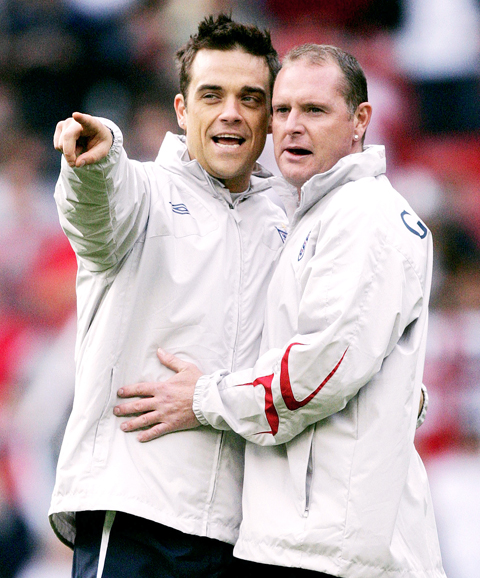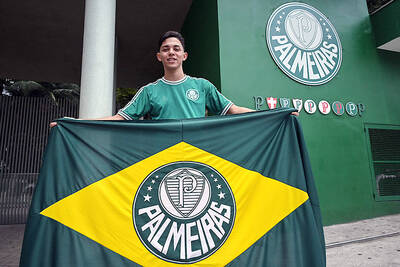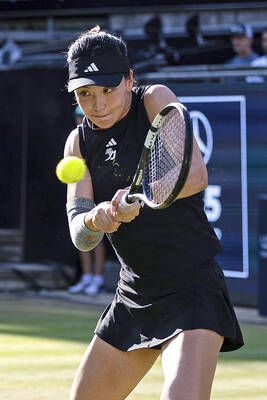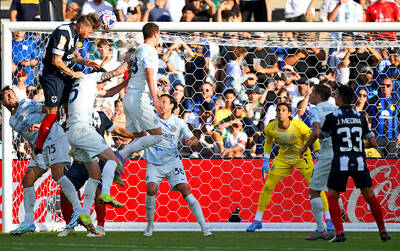When the police pulled Paul Gascoigne out of the bath in which he was trying to drown himself on Sunday afternoon, he was crying.
It is almost two decades since the image of Gazza’s tears caught the public imagination to such a degree that it could be said to have kick-started the renaissance of English soccer, a phenomenon which reaches its ceremonial climax in Moscow later this month. Now his latest bout of weeping marks another stage in the terrible decline of a man who once held the status of the UK’s favorite clown.
But that was long ago, and in any case short-lived. Gascoigne stopped being funny even before he stopped being a real soccer player. If his comic turn wasn’t terminated by various indiscretions into the microphones of television reporters, it ended for good and all back in 1996 with a now famous tabloid front page headline: “Gazza beats Sheryl black and blue.” After that it became a tragedy.

PHOTO: AP
It seems horribly poignant that Gascoigne’s latest escapade should have begun at the Royal Garden Hotel in Kensington, central London, the place where, so many Saturdays earlier, Alf Ramsey and his England team gathered in celebration on the night of their World Cup triumph. That was two years before Gazza was born.
Now the 40-year-old former soccer player spent this particular Saturday afternoon first having his hair dyed red at a local salon and then, apparently displeased with the result, shaving it all off.
Invited to leave the hotel that night after fire alarms were said to have been activated when he smoked in his room, he moved to the Mandarin Oriental, about 1km away, where his demands for cocaine on room service caused a certain amount of disruption.
This time he took a short walk down Sloane Street to the Millennium Hotel. Behaving erratically, he checked in with a bottle of gin in his hand and was soon calling down for more.
Staff were alarmed when, having ordered a steak, he rang down again to tell them to cancel the steak but to send up the steak knife. The police were called, found him trying to submerge himself in an overflowing bath and took him to hospital.
There are probably people who think that Gascoigne’s story should not be viewed as a tragedy, that a man who spent more than a decade earning a top soccer player’s salary does not deserve the sympathy implicit in such a description after indulging in so wasteful and idiotic a lifestyle. But the real tragedy of Gascoigne’s decline is how obvious it all seemed, and how those who were in a position to help him took the wrong decisions at crucial moments, while those who wanted to help were powerless.
Imagine how the story might have gone if he had kept his promise to Alex Ferguson in the summer of 1988, shortly after he had been named the young soccer player of the year. He intended to leave Newcastle United, and Ferguson was desperate to have him at Old Trafford. But by the time the Manchester United manager returned from his holiday, Gascoigne’s advisers had agreed a deal with Tottenham Hotspur, and the player had signed. Those same advisers later negotiated his further transfers to Lazio and Rangers, both moves with spectacularly negative consequences for Gascoigne’s mental equilibrium.
Would Ferguson have been able to use the right length of rein to control Gazza’s headstrong urges? No one will ever know, but it’s hard to avoid feeling that he might have been better equipped than Terry Venables to show him the line where pranks end and self-destruction begins. Perhaps Ferguson feels relieved that the opportunity was denied him; he certainly regrets the disappearance of the opportunity to work with a player of such gifts.
Is it really too late now, after so many trips in and out of rehab, for this flawed, chaotic figure to accept help and guidance from the right quarter? Can no one offer him a home, in both the concrete and the spiritual senses, where he might maintain a constructive link with the game he loves while being absolved from the deadly requirement, imposed by himself as much as by the outside world, to be Gazza?
If it is true that nothing can be done, that there is no effective therapy for his madness, then one day soon the tears will be ours.

Brazil has four teams, more than any other country, in the expanded Club World Cup that kicked off yesterday in the US, but for SE Palmeiras, the competition holds a special meaning: winning it would provide some redemption. Under coach Abel Ferreira since 2020, Palmeiras lifted two Copa Libertadores titles, plus Brazilian league, cup and state championships. Even before Ferreira, it boasted another South American crown and 11 league titles. The only major trophy missing is a world champions’ title. Other Brazilian clubs like Fluminense FC and Botafogo FR, also in the tournament, have never won it either, but the problem for Palmeiras

Lionel Messi drew vast crowds and showed flashes of his brilliance when his Inter Miami side were held to a goalless draw by African giants Al-Ahly as the revamped FIFA Club World Cup got off to a festive start on Saturday. Fans showed up en masse for the Group A clash at the Hard Rock Stadium, home to the NFL’s Miami Dolphins, but Messi could not fully deliver, his best chance coming through a last-second attempt that was deflected onto the crossbar. Inter Miami next face FC Porto on Thursday in Atlanta, while Al-Ahly, who benefited from raucous, massive support, are to

Twelve days after winning her second Grand Slam title at the French Open, Coco Gauff fell at the first hurdle on grass in Berlin on Thursday as beaten Paris finalist Aryna Sabalenka advanced to the quarter-finals. Recipient of a first round bye, American Gauff lost 6-3, 6-3 to Chinese qualifier Wang Xinyu as world number one Sabalenka beat Rebeka Masarova 6-2, 7-6 (8/6) in her second round tie. Winner of 10 main tour titles, including the US Open in 2023 and the WTA Finals last year, Gauff has yet to lift a trophy in a grass-court tournament. “After I won the first

Sergio Ramos on Tuesday outfoxed two Inter players and artfully headed home the first goal for Monterrey at the FIFA Club World Cup. The 39-year-old Ramos slipped through the penalty area for the score just as he did for so many years in the shirts of Real Madrid and Spain’s national team, with whom he combined smarts, timing and physicality. Ramos’ clever goal and his overall defensive play at the Rose Bowl were major factors in Monterrey’s impressive 1-1 draw against the UEFA Champions League finalists in the clubs’ first match of the tournament. “There is always a joy to contribute to the